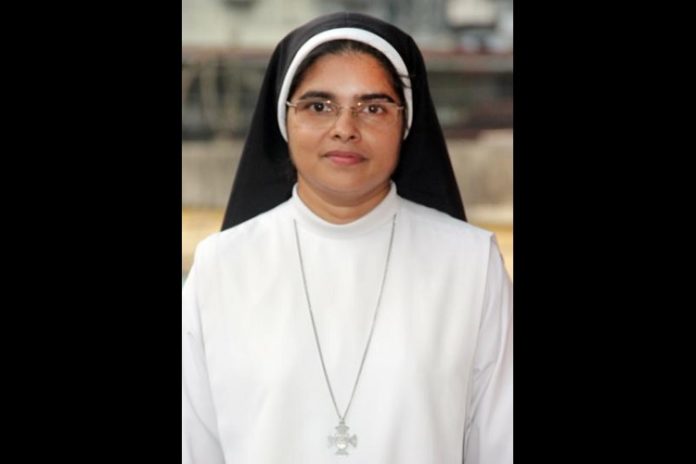Church
A nun who wanted to quit a Kerala church, now faces criminal cases, branded mentally unstable
“I forgave them and tolerated everything till now. I cannot take it any further,” Sr Mary Sebastian says.
Megha Varier| Monday, August 8, 2016 – 12:24
Kerala Kaumudi
Facebook Twitter Email Google Reddit
The Church preaches charity, kindness, and compassion towards everyone but Sr. Mary Sebastian, a 45-year-old nun, is afraid that the very institution that she has served for 25 years might harm her.
Sr. Mary wants to leave the Church and it is a well-known fact that the Church does not take too kindly to rebels.
In January this year, Sr. Mary took the decision to quit the Church because of the harassment that she allegedly faced in the hands of her superiors at the Syro-Malabar Church’s Cherthungal Nasrathubhavan Convent under Congregation of the Mother of Carmel (CMC) in Pala, Kottayam district of Kerala. She has been living there for the past three years.
Sr. Mary approached the Church to grant her 3 years of exclaustration that allows a nun to stay outside the convent as a common citizen and return to the convent after the designated period.
However, she was denied permission as the Church feared that granting her this would encourage other nuns to follow suit.
When the Church deliberately delayed the proceedings, Sr. Mary approached the Kerala Catholic Church Reformation Movement, an organization that works for rehabilitation of ex-priests and ex-nuns. Matters went haywire after the organization intervened.
In May, she was given dispensation and was asked to quit the Church. Having decided that it is best to do so, Sr. Mary demanded that she be paid her due in order for her to lead a life outside the church. The authorities objected.
Renji Njellani, organizing secretary of KCRM, points out that any priest or nun who wishes to quit the Church is entitled to be given money according to the canon law. The Church refused to pay the sum of Rs.30 lakh that Sr. Mary demanded and offered to pay Rs.1 lakh, after months of negotiation.
Two weeks ago, Sr. Mary filed a complaint with the Human Rights Commission and Women’s Commission alleging that she was facing physical and mental harassment at the hands of her superiors. But after she approached Women’s Commission, the Church, she alleges, has found new ways of taunting her.
They even filed a police complaint recently, accusing her of theft. She says that police officials threatened her to quit the Church as per their order.
Last week, a complaint was filed with Child Welfare Committee accusing her of harassing the children at Balabhavan, a children’s home associated with the convent. Sr. Mary claims that the authorities of the committee forcefully made her sign a document pledging that she will stay away from the children.
Renji points out that the Church in fact uses the committee to its own advantage, with priests appointed in key positions.
“I am scared for my life…They are so powerful that they may even harm me!” – these were her first words as Sr. Mary spoke to The News Minute over phone.
Sr. Mary claims that false allegations have been levelled against her ever since she joined the Church.
In 1997 when she was a student of Master of Social Work, her superiors at the convent had accused her of being in a relationship with a priest.
“Nobody asked for any explanation from my side…I wasn’t given a chance to prove the allegations wrong, or at the least defend myself. They accused me of wrongdoing and I was forcefully sent for retreat camps where I wasn’t allowed to speak to anybody. I used to spend the days cut off from the outside world,” she says.
But things became worse when in the early 2000s, Sr. Mary objected to a misappropriation at Shanthinilayam, a special school in Pala run by the Church.
“When I found that they were forging documents to include nuns in the teachers’ list to claim university grants, I objected. I discussed the issue with other nuns and the superiors came to know about it. Since then, they have constantly been trying to tag me as a mentally challenged person,” she says.
She also alleges that she was repeatedly transferred from one convent to the other, at the behest of the Church, often in the middle of an academic year.
Sr. Mary, who works as a teacher at a school run by the Church, says that she was brutally assaulted by her superiors at the various convents she has lived over the years.
“They would hit me, accusing me of various things, including robbery. They hid letters addressed to me. I forgave them and tolerated everything till now. I cannot take it any further,” she says.
The Church involved her family in all these matters too and would demand that they visit to sort things out.
Sr. Mary’s decision to leave the Church citing harassment is not a unique instance. Only a few years ago, Sister Jesme, who had been a nun for over 33 years, quit the Church alleging harassment by her superiors. Her leaving and the subsequent release of her autobiography “Amen: The autobiography of a nun” had created a huge controversy at that time. Sr. Abhaya’s murder, in which priests are the prime accused, is yet another example of how things are not exactly holy in the Church.
Once she leaves the convent, Sr. Mary cannot go back home.
“Do you know what it means to be a nun who quit the Order? Our society hasn’t grown enough to accept such things. People will see it as my betrayal towards Jesus. But only if they knew that my fight is against the Church and not Jesus….”
She says that her family does not want her to return home. “In fact they don’t want me to quit the Church. It is all because of the stigma that is associated with it. Society will only target my family for my actions.”
Dismissing the allegations of harassment at the hands of superiors, spokesman for Syro-Malabar order of the Catholic Church, Dr Paul Thelakkat states that the Church does not stop anybody from quitting.
Saying that he is unaware of the case in detail, Dr. Thelakkat claims that the canon law does not prescribe the Church to pay compensation to those who quit.
“As far as I understand, there is only one problem here. If the nun wants to quit, it is up to her to decide. But she cannot hold the Church responsible to provide rehabilitation. When a nun joins the Church, she voluntarily does so, agreeing that she will not hold any property under her name. Then how can she now stake claim in the Church’s joint property?” he asks.
Instances where the Church does provide monetary help to those who quit are purely out of ‘humanitarian concerns’, he maintains, adding that the nunnery is a service and not a means to earn money.
This first appeared in NewsMinute
Feature image courtesy newsminute



























